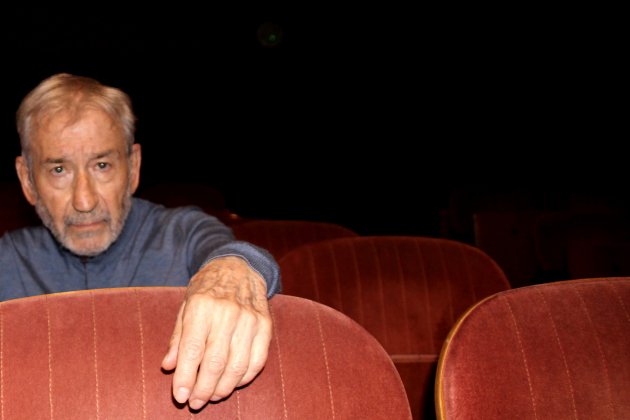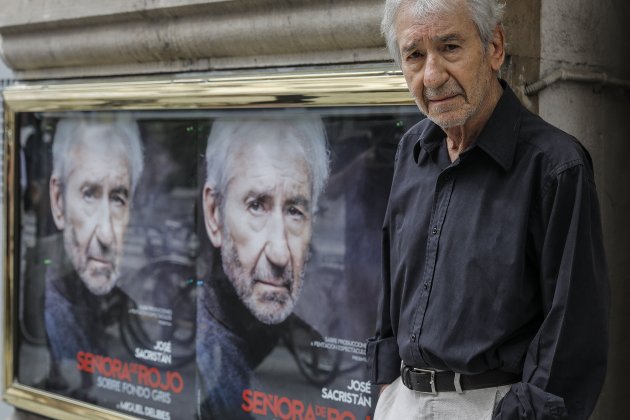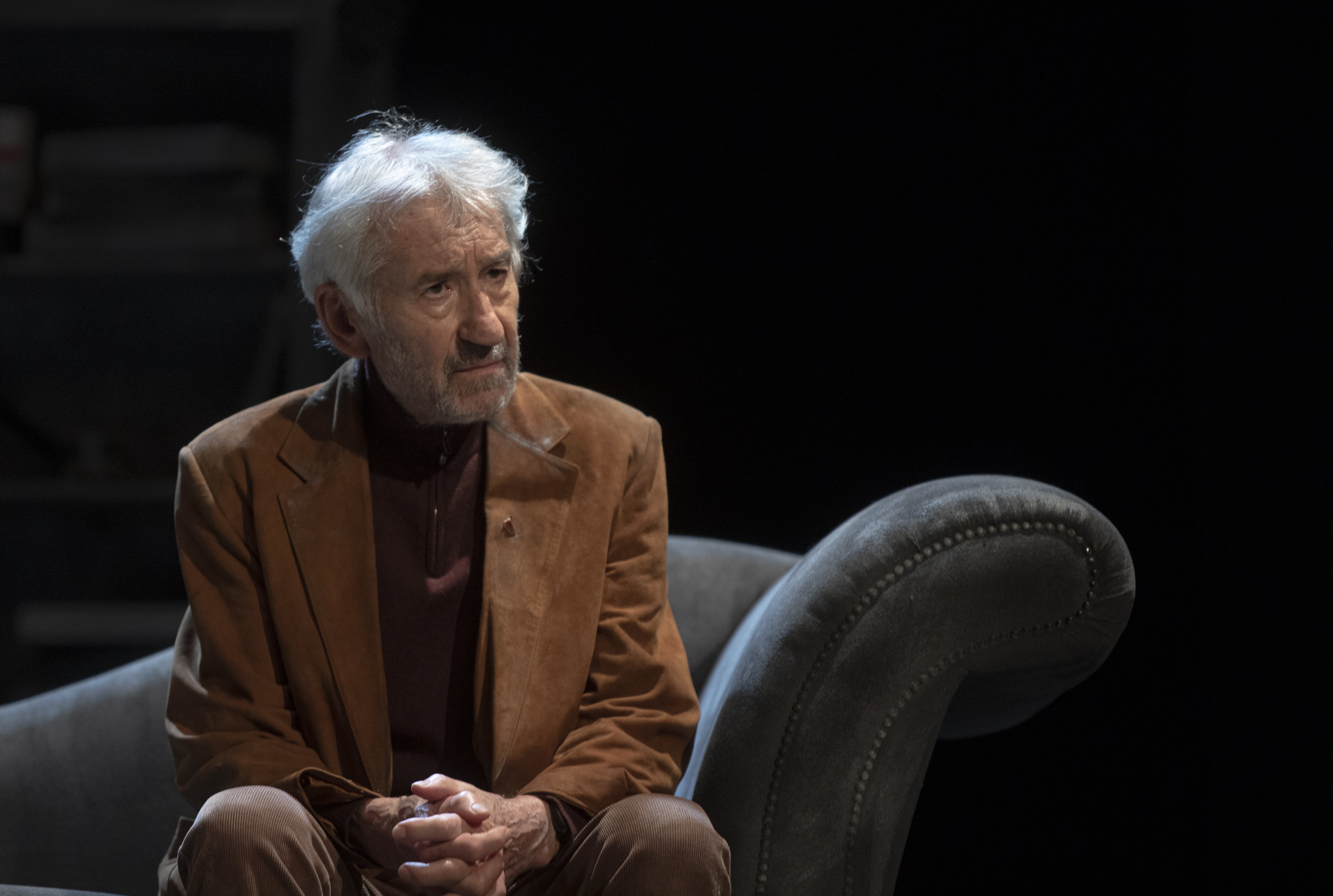José Sacristán is 84 years old, but, to use a cliché, he looks much younger. A masterful actor with decades of experience on the stage and a Spanish filmography as long as your arm, he has recently installed himself in the Teatre Romea in Barcelona, where until November 7th he will be presenting Señora de rojo sobre fondo gris ("Lady in red on a grey background"), the first monologue, based on the novel of the same name by Miguel Delibes, in his very long career. A cavernous voice with forceful resonance, an analytical gaze that has the security of someone with eight decades of a life journey on his shoulders; we meet the actor from the Castilian town of Chinchón to relive his present, his past, and his future. Also his principles, values, ideas and declarations.
At 84 years old and with such a very long career, for the first time you are doing a monologue.
It is neither sought nor premeditated. It arrived in a totally natural way. I have been in love with this novel since it was published in 1991. It also happened that at that very moment I was putting on a play by Miguel Delibes. Even then I wanted to bring this work to the theatre, but he never wanted to give up the rights to do so. Neither for theatre or cinema.
Did he ever tell you the reason for this refusal?
He considered it an extremely personal story. A kind of vomit. His words, verbatim, were that he did not want anyone to put a face to the character of Nicolás because he hadn't dared to put his own.
Nicolás, the protagonist of the story, is Miguel Delibes.
It took some time and it was his children who ended up authorizing the theatrical version of the novel.
I have always shunned settling into a comfort zone. I am moved by curiosity and risk
And don't you feel an extra responsibility, knowing that the author didn’t want the novel to be brought to the theatre?
It has certainly been a very delicate process, calculating very carefully all the steps we took with my friend José Samano, who helped me in the theatrical adaptation of the text. At the time Miguel Delibes authorized me to do a dramatized reading of some passages from the novel. Years later, the response I have had from his children has not only been one of approval but of applause. In fact, when we premiered it, one of his children approached me to confess that he, in the family meeting, had refused to agree to the theatrical version, because that was his father’s wish. But that night he came to thank me because he told me that for a while his mother had been brought back.
Once again, Nicolás is Miguel Delibes and Ana is Ángeles, his wife, who died in 1974 of a brain tumour.
Every night when I go on stage, I have the prudence, the caution and the care to know that I am playing a character named Nicolás, who is a painter, but being fully aware that he is actually Miguel Delibes himself. And that Ana, yes, is Ángeles, his wife. Along with this, there is an added value that is all that permeates the memory of a man like Miguel Delibes, and it is that, beyond a great writer, he was a great person. I’m sure that now he wouldn’t have had any objection to depicting Señora de rojo sobre fondo gris. The relationship between an actor and the author of the text he interprets, even if it seems obvious, depends on how the author is and how the actor is. It depends on what they are like as people and the relationship they maintain. I have met a lot of authors and I have not had the same relationship with all of them. And there is none whose work has interested me as much as Miguel Delibes and his Señora de rojo sobre fondo gris and before that Las guerras de nuestros antepasados (The wars of our ancestors, University of Georgia Press).

José Sacristán will be at the Teatre Romea until November 7th. Photo: Oriol Rodríguez
Is this a role that can only be played at a certain moment in life, when one already has a lot of experience and has done a lot?
You need to have some idea, because the events not only happen when the protagonist has already reached a certain age but also he remembers them some time later. But it’s a role that could be performed by someone far younger than me, because I already have too many years on top of me at all levels and effects. But in any case, professionalism, experience and veteran status are not necessarily a guarantee of talent. There are people who have died of old age doing everything just as badly as the first day. And suddenly a very young girl or boy appears, like Mozart did with Salieri, or like Orson Wells with the rest of his contemporaries, and they end up showing how things are done. The interesting thing about this trade is that it involves lifelong learning.
By that rule of three: you're a better actor now than when you started.
No. I have always shunned settling into a comfort zone. I am moved by curiosity and risk. Of course, now I have a whole series of tools and data that give me some security, but I avoid relying too much on them because what I like is adventure. Whenever I go on stage, I do so with the intention that the viewer will have the impression that my performance has neither happened before nor will it happen again after.
I was the prototype 'little Spaniard of the transition'. It was up to me to be the transmission belt for those stories.
I sense that you have no need to be nostalgic.
Well I do. I like to get lost in melancholy. I never forget where I come from and who I come from. I like to look back and recognize myself on the path I have taken. Of course, I try to look ahead of me from time to time so as not to always run into the headlights. But yes, I like to travel through memory and its surroundings. I’m a sentimentalist who thinks sentimentality is shit.
What do you miss from the past?
Youth. I miss the margin of life that I had years ago.
You've always tended to play those melancholy and sad characters.
The phone would ring and they offered me what they offered me. I had to pay the electricity bill and the school for the kids. I've done food industry jobs and I've also learned a lot from them. I am a worker in culture. However, this appreciation of the melancholy characters is very true, but they are roles that I did not seek. I was the prototype 'little Spaniard of the transition'. It was up to me to be the transmission belt for those stories. A guy who was nothing special and just hadn’t grown up or developed at all. And so we go on.
So we go on?
So we continue in this attempt to develop and grow up properly.
You as an individual or society at large?
Society. We still trip ourselves up more than we should. I am part of a species in which injustice and abuse occur much more than they should. However, I must admit that, personally, I have a situation of professional and vital privilege. I am 84 years old and Mother Nature is treating me more than well. You could imagine living to be 180, but one thing is what you imagine and another is the reality you have to live. In my case, I would be mean-spirited if I complained.
I try to keep alive the child I was and his capacity for surprise.
When did you fall in love with the acting profession?
In the village cinema. I was fascinated the first time I went. It wasn’t until much later that I discovered that this was a job. There, in the cinema, I was captivated by the Indians, the gangsters, the musketeers, the gunmen... That was magic in its purest form. It still is. I try to keep alive the child I was and his capacity for surprise.
When did you discover that acting was a profession?
In Madrid, when my father was released from prison and they banished him to the city. I would have been 7 or 8 years old and I started to learn that there was one called Tyrone Power, another John Wayne and another...

Señora de rojo sobre fondo gris is the first monologue in José Sacristán's career. Photo: Europa Press
Your father, however, has always been your greatest reference, right?
Ooh... The figure of Benancio... He has always been my most wonderful adversary.
Adversary?
He was always an example of dignity and honesty. And at the same time, the man who made it hardest for me to be an actor.
To me the unity of the homeland is something that I don't care about at all.
Why?
With the information he had, what he tried to do was what he had to do: redirect me to another profession and make me a worthy man. I come from the Castile of the peasants. And the values they instilled in me I remember and keep alive every day and at every moment.
Getting into values and ideological and political issues, you have been very critical of the independence process.
I haven’t been very critical. I have simply been critical. I respect very deeply the independence hope. I'm sick to death of hearing of 'Spain: one, great and free', 'through the empire to God', and 'the unity of destiny in the universal'... To me the unity of the homeland is something that I don't care about at all. I insist, I deeply respect the pro-independence sentiment, but not its leaders.
Why?
I find that their way of acting... I would not accuse them of rebellion or sedition, I just find that they have been clumsy. I would accuse them of having done it wrong.
José Sacristán, in Señora de rojo sobre fondo gris

